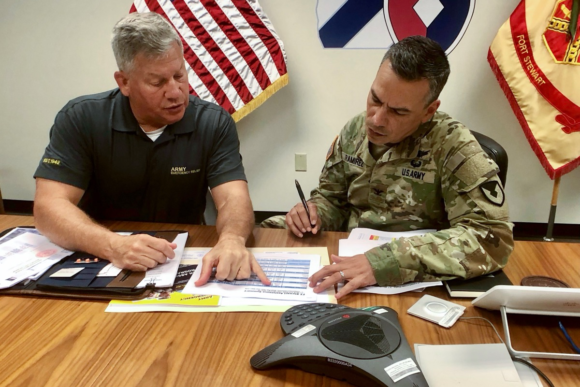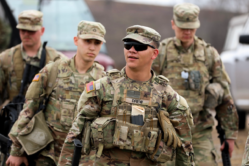Transitioning to civilian life comes with new challenges, and one of the most critical is personal debt. A November 2020 study by the Consumer Financial Protection Bureau showed that many veterans go into steep debt within six months to a year of separating from military service.
Thousands of these veterans – many of whom served in war zones in Iraq and Afghanistan–have turned to nonprofits that support veterans.
“The transition from the military to civilian life is not the easiest,” said Trace Chesser, an Army combat veteran who is now president and CEO of USA Cares, a non-profit group that provides emergency financial assistance to veterans.
Military service comes with a steady paycheck, annual cost-of-living raises and stipends for housing and meals, Chesser said.
“They’re accustomed to a very routine, safe, consistent income, and then they get out, and they’re underemployed and struggling with the transition itself,” he said. These challenges can leave veterans one crisis away – a major car repair, for example – from getting into thousands of dollars in debt.
Various national and regional groups offer emergency financial help to veterans.
We reached out to several that are highly rated by organizations that evaluate charities. Here are three ways in which these groups can provide short-term help and training for long-term financial stability.
Dealing with the Immediate Crisis
A utility company is about to shut off power unless its bill is paid. A landlord or bank is threatening eviction or foreclosure. A lender is preparing to repossess a car. These are typical cases handled by USA Cares, which mostly serves post-9/11 veterans.
The organization reports that it has helped more than 100,000 veterans and their families with grants totaling nearly $10 million since starting in 2003. Housing, utilities and car payments make up the bulk of the emergency grants, which can be ready in 48 hours.
Other nonprofit groups that provide emergency assistance include the Iraq and Afghanistan Veterans of America (IAVA), Operation Homefront, the American Legion and the Semper Fi Fund.
The organizations use professional caseworkers to verify a veteran’s financial needs. After a decision to help is made, the money is paid directly to the auto mechanics, landlords or other creditors. Many of these organizations also offer assistance for food and housing.
Preparing for Financial Stability
USA Cares requires veterans who receive emergency assistance to participate in its financial planning education class.
The course focuses on how to reduce debt, build savings and maintain a household budget. Such skills are critical in the first year after leaving military service, Chesser said. Veterans often need civilian credentials to do the job they did in the military as a police officer, a paramedic, or a truck driver. That can take extra training and time, leaving them vulnerable to late payments on bills.
Operation Homefront targets its financial counseling to transitioning veterans enrolled in one of its housing programs. These veterans receive one-on-one financial counseling with a caseworker to learn to reduce debt, build savings and improve credit.
“Most of our folks that separate from the military have little or no savings. Any unexpected bill throws them into absolute crisis,” Thomas said.“You’ve got to establish a budget, and you’ve got to stick to your budget.”.
The Department of Veterans Affairs has resources for financial education, including counselors who can help with avoiding foreclosure.
The nonprofit National Foundation for Credit Counseling, founded in 1951, provides financial planning and debt counseling services aimed at veterans. Military OneSource, a wide-ranging resource for financial coaching, is now available for veterans and their families for up to 12 months after separating from the military.
Addressing Underlying Issues
The IAVA’s Quick Reaction Force (QRF) has served some 9,000 veterans since 2012. Beyond providing immediate aid, the program aims to get at the root of financial problems that might have nothing to do with money. The IAVA reports that about 80 percent of those who reach out for financial aid need further help for other issues like mental health or physical disabilities.
“When you’re experiencing that and you’re struggling with transitioning, your brain does not have the capacity to effectively manage something like your finances,” said IAVA Executive Vice President Hannah Sinoway. “These people are just holding on to get through the night.”
IAVA uses a concierge-style program to help these veterans navigate the extensive but complex network of resources. “We’re going to educate our clients and let them know about the available landscape of resources,” Sinoway said.
They don’t simply provide a list of agencies. IAVA staff may do a conference call to personally connect a veteran with the right service or agency, or help a veteran fill out intake forms. “We’re going to do a warm handoff,” Sinoway said.
Staff will also make follow-up calls to both the veteran and the referral agency “to really ensure that the veteran has everything they need,” Sinoway said.
“I was on the front lines of our program for years, and stopping an eviction was a great day,” Sinoway said. “But an even better day was when I worked with a client and they really, truly got on a pathway toward a more stable future for the long term,” she said.
Veterans looking for more information about how to get help can start with the following:
- More information on how to connect with the IAVA’s Quick Reaction Force includes phone numbers and digital chat resources that can be accessed 24 hours a day, seven days a week.
- Operation Homefront has a “Get Help Now” link for emergency assistance. Veterans and their families can also call the Critical Financial Assistance Line at: 1-877-264-3968 (toll-free), or 210-549-4600.
- USA Cares takes applications for emergency aid on its website. You can also call or email the group at 1-800-773-0387 and [email protected]
- Charity Navigator evaluates hundreds of thousands of charitable organizations based in the United States. The group publishes a list of highly-rated nonprofits that provide services like financial assistance for food, housing, utilities and other expenses to veterans. The information lists dozens of charities and includes links with contact information and instructions on how to apply for help.




About the comments on this site:
These responses are not provided or commissioned by the bank advertiser. Responses have not been reviewed, approved or otherwise endorsed by the bank advertiser. It is not the bank advertiser’s responsibility to ensure all posts and/or questions are answered.